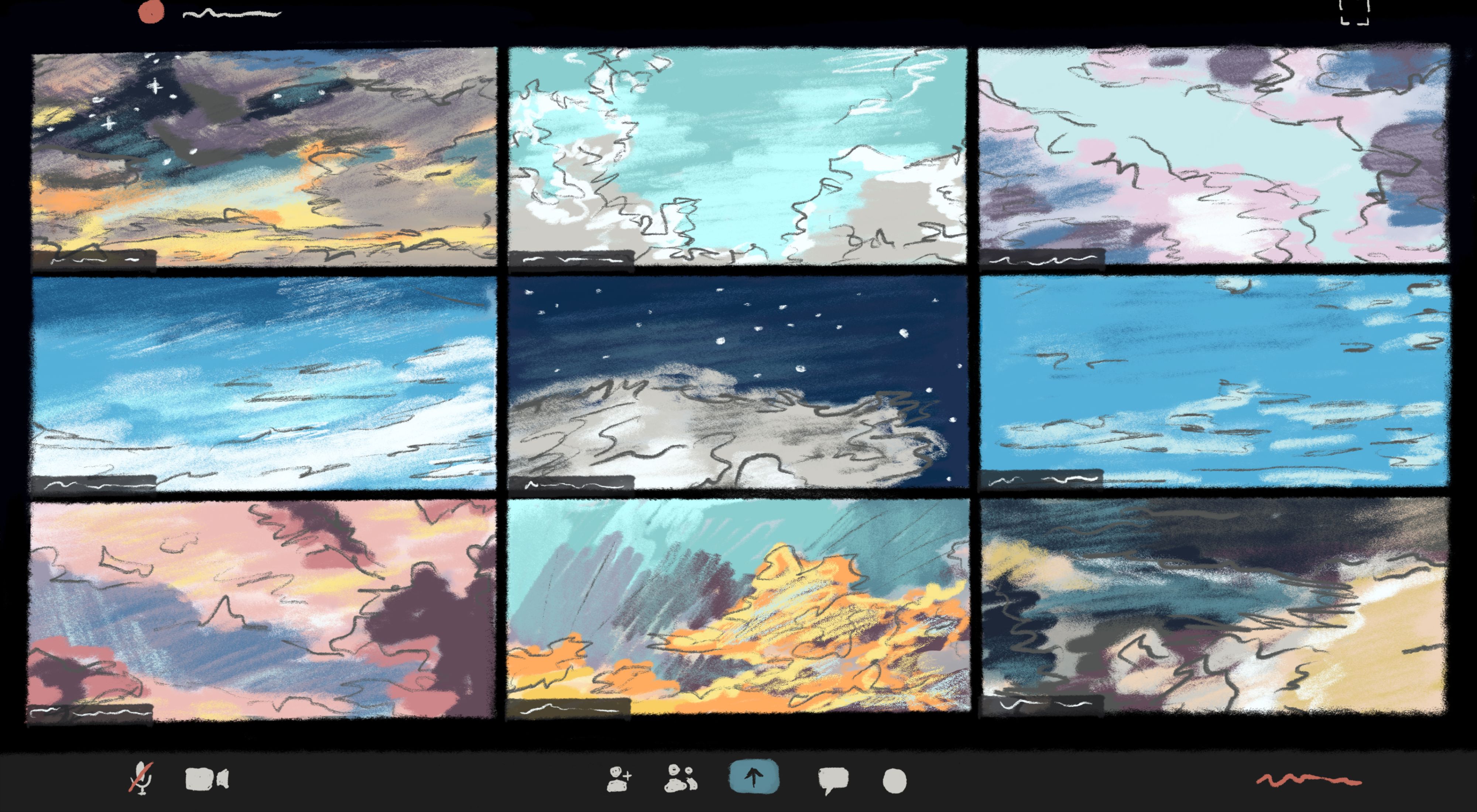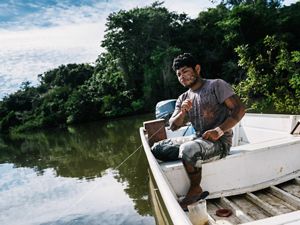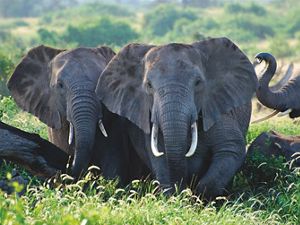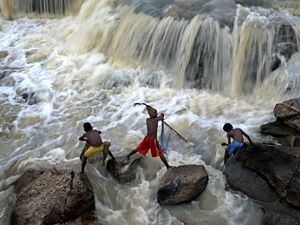Conservation in the Time of COVID-19: Notes From the Field
Dispatches from TNC staff around the world on forging ahead—and staying hopeful
We are facing a global health crisis unlike any in recent memory. During this uncertain time, our primary concern is the health of our loved ones, our colleagues, and our communities. But this experience also tells us it is more important than ever that we keep working toward a sustainable future.
Here we share dispatches from TNC staff around the world as they do their best to carry forward with our mission: to protect the lands and water on which all life depends. Around the world, they are grappling with anxieties while maintaining resolve, adapting their work, and finding inspiration and hope in their communities and nature.
The best-laid plans have shifted.
 “2020 was gearing up to be the ‘year of nature,’ with major meetings of the Convention on Biological Diversity (the big treaty to protect biodiversity) and the UNFCCC (the big treaty to fight climate change), as well as the World Conservation Congress (the big meeting to set the environmental agenda for the next decade)…
“2020 was gearing up to be the ‘year of nature,’ with major meetings of the Convention on Biological Diversity (the big treaty to protect biodiversity) and the UNFCCC (the big treaty to fight climate change), as well as the World Conservation Congress (the big meeting to set the environmental agenda for the next decade)…
“All of that activity and organizing to fight for big policy changes has been put into flux by the pandemic. Some good things may still happen, but the ‘year of nature won’t unfold as we had hoped.'”
- Rob McDonald, TNC Scientist; Arlington, VA, USA
 “I typically spend 2-3 days a week this time of year in the field doing water quality research, and also spend several hours a week at the local university processing the water samples. I have been doing this type of work for 13-plus years for TNC, so it feels very strange to hang up my waders for a while."*
“I typically spend 2-3 days a week this time of year in the field doing water quality research, and also spend several hours a week at the local university processing the water samples. I have been doing this type of work for 13-plus years for TNC, so it feels very strange to hang up my waders for a while."*
- Krista Kirkham, Aquatic Ecologist; Peoria, IL, USA
“I’m working with the Blue Bonds team on what all the swings in credit markets might mean for our conservation deals. I worry about how investors might—or might not—choose to deploy capital in a global recession as we continue to develop new deal ideas.”
- Charlotte Kaiser, Managing Director; NatureVest; New York City, New York, USA
 “Clearing invasive plants to avoid water losses and protect biodiversity in Greater Cape Town’s watersheds had to stop. We were implementing at full capacity and are now losing the very momentum we gained. 120 people who had access to job opportunities through the Greater Cape Town Water Fund were sent home—they are now without an income.”
“Clearing invasive plants to avoid water losses and protect biodiversity in Greater Cape Town’s watersheds had to stop. We were implementing at full capacity and are now losing the very momentum we gained. 120 people who had access to job opportunities through the Greater Cape Town Water Fund were sent home—they are now without an income.”
- Louise Stafford, South Africa Water Funds Director; Cape Town, South Africa
And we’re concerned for our communities.

“India has seen the largest movement of people it has witnessed since independence in 1947. Many people are walking back home as urban centers shut down. I think we may need to really think hard about how to work with rural communities who live close to nature in places where we work and how we can support them differently.”
- Priya Shyamsundar, Global Science Lead Economist; Arlington, VA, USA
“In recent decades, Mongolia has increased its percentage of protected lands, helping communities to change their land management practices in a conservation-friendly way—safeguarding wildlife species and habitat. But COVID-19 has already started to affect economies all over the world, and I am hoping the biggest public donors for developing countries—such as the EU—will still recognize the importance of international conservation efforts.”
- Enkhtuya Oidov, Mongolia Program Executive Director; Mongolia
“After missing six days of work due to contracting the virus, I am back at work ... This virus is like a speeded up version of climate change. It’s hard for huge parts of the population to see and feel, but we must all work together to stop it or the impacts will be much, much worse.”
- KATY DENSMORE, Director of People & Operations; Arlington, VA, USA

“Poor coastal communities, like Ancon, are exposing themselves to provide food for the country and make a living through this critical time. Since food supplying is one of the few activities permitted during this period, we are trying to support the fishers that work with us to make sure they have all the health and safety elements to reduce risk. We are also looking for opportunities to get additional funding to help cover the basic needs of these fishing communities.”
- Matias Caillaux, Fisheries Specialist; Lima, Peru
“It’s the first time we are calling off urgent season-based conservation activities with farmers in Upper Tana in Kenya and Sebou in Morocco ... There is a lot of urgent work that needs to be done in Africa, yet the real doers aren’t very many. We cannot afford to lose time.”
- Fredrick Kihara, Africa Water Funds Director; Nairobi, Kenya
But we look to the future with hope.

“World Water Day was on March 22, and despite all the restrictions from celebrating it outdoors with communities as we have always done, the emphasis on washing hands using flowing water has made lots of leaders and communities appreciate the value of the sustained flow of clean water to urban and rural communities, where Water Funds invest."
- Fredrick Kihara
"I've just entered the final trimester of my first pregnancy—this meant a lot of added worry and uncertainty about what's to come, as well as if this is the "new normal." But I see human initiatives across the world, like young people running errands for the older, and that gives me hope that we will collectively emerge stronger out of this."
- Dragana Mileusnic, Southeastern Europe Program Manager; Brussels, Belgium
“Seeing how communities in Peru are working together to go through this crisis, especially those who have the least, is a source of inspiration and hope.”
- Matias Caillaux

“Every year farmers and ranchers must face the uncertainty of the weather, markets, diseases that impact plants and livestock, and so on. So the flip side of this uncertainty is potential. They see the potential every year, and now it’s time for me to do the same.”
- Pipa Elias, North America Agriculture Director; Arlington, VA; USA
And remain resolved to work together toward a more sustainable planet.
“The specifics may be different for everyone—but the sense of agency that comes with staring adversity in the face, pausing to feel whatever comes up, and then unlocking the creativity that follows when you are open to it—that’s something we are all capable of.”
- Claire Peters, Program Specialist, Indigenous Peoples & Local Communities, Monterey, CA; USA

“Although we are physically disconnected, I feel a stronger connection between us; like there is an underlying sense of support for everyone. We are all in this together, and our resilience will get us through.”
- Krista Kirkham

“I miss working with my colleagues in person, but this challenging situation has presented us with opportunities to focus on connecting in new and creative ways to continue supporting our communities. And though we have to exercise caution with every excursion outdoors, seeing spring bloom in the parks near my home has been a source of joy and motivation for me.”
- "Sally" Liang Shan, Director of Marketing & Communications; Beijing, China
“During my first week of mandatory telework, the magnolia tree in our front yard was blooming. It is a spectacular sight each year, but ephemeral. I was happy to be home to enjoy it all day during the only week that’s possible…
This situation is not acceptable, but that means on the other end of it we will ask for things to be different. For our systems to be more resilient. For our world to start working with nature, not against it. For new ways of working and taking care of our communities.”
- Pipa Elias

Learn more about what TNC is doing:
- Support African Wildlife: Learn more about the Wildlife Conservancies Crisis Fund.
- Visit Nature Lab, our education hub for teachers, students and families.
Our global insights, straight to your inbox
Get our latest research, perspectives and solutions to today’s sustainability challenges.
Sign Up*Krista Kirkham resumed her work after a two-week hiatus from the field.
Global Insights
Check out our latest thinking and real-world solutions to some of the most complex challenges facing people and the planet today.




